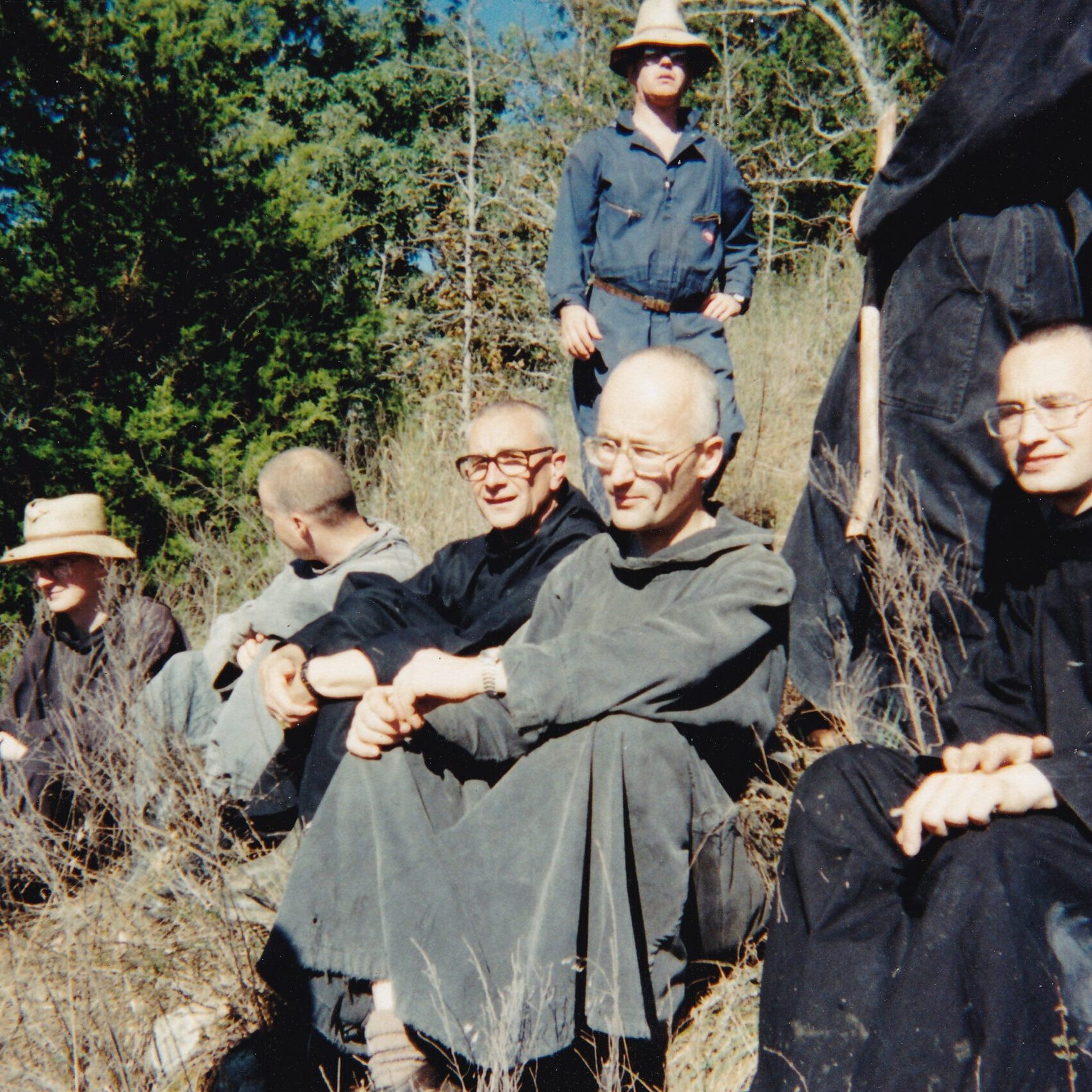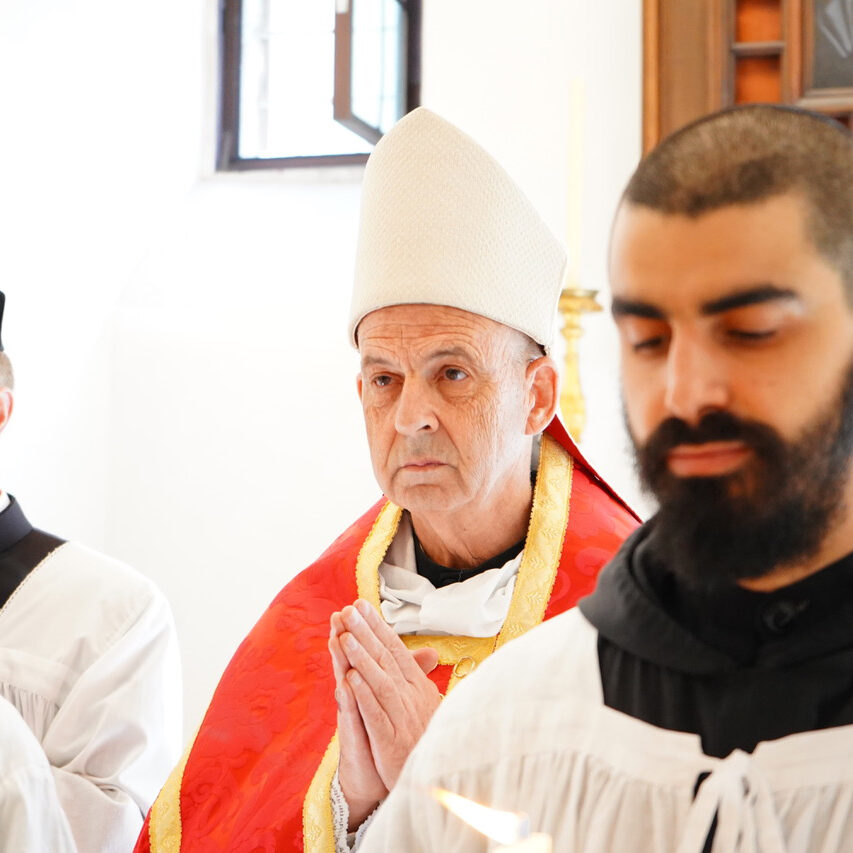Tears are the deluge falling on sins, the purification of the world. – St. Gregory Nanzianzen
Truly you are blessed, Abba Arsenius, for you wept for yourself in this world! – Abba Poeman
Dear Friend of Clear Creek Abbey,
One of the secrets of the ancient monks, one that helped them shape the destiny of the Christian world, is found in the tears they shed as an integral part of the spiritual life. These were not tears of self-pity or the “crocodile tears” of sobbing souls who are slaves of their own emotional ups and downs. No, these were liberating tears of compunction that opened again in some way the Paradise lost by our first parents.
Abba Joseph related that Abba Isaac said, “I was sitting with Abba Poemen one day, and I saw him in ecstasy, and as I was on terms of great freedom of speech with him, I prostrated myself before him and begged him, saying, ‘Tell me where you were’. He was forced to answer and he said, ‘My thought was with Saint Mary, the mother of God, as she wept by the cross of the Savior. I wish I could always weep like that.’ ” (Alpha, Poemen, 144)
The fundamental idea is straight out of the Gospel of the Beatitudes, the fifth Beatitude in St. Matthew’s list (5:5), “Blessed are they that mourn: for they shall be comforted.” The expression is slightly different in St. Luke: “Blessed are ye that weep now, for you shall laugh” (6:21). How this view of things contrasts with the unbridled pleasure-seeking of today’s “party culture”!
It is a most excellent thing, during this time of Lent dedicated to preparing our hearts to celebrate the great joy of Easter, to put ourselves in the school of Saint Benedict, who had the gift of tears in prayer and who wrote in his Rule that the monk should “daily confess in prayer” his “past sins with tears and sighs to God, and amend them for the time to come” (Chapter 4, 58th instrument of good works). He also directed his sons to practice a holy cheerfulness alongside these spiritual tears, telling them during Lent to await “holy Easter with the joy of a spiritual longing” (Chapter 49).
Many of you ask us how you can learn the contemplative life while leading an existence outside the monastery walls. There would be much to say on this subject, but one thing is clear: it is through the tears of compunction that peace comes to the heart and through this peace that contemplative prayer develops. “What if I cannot experience this compunction because of countless distractions in my life in the world?” The answer is that these very distractions and afflictions you have in the world will create the desire for peace and happiness that are the beginning of the process. The Holy Ghost will do the rest, as St. Paul teaches us: “The Spirit helps us in our weakness: for we do not know how to pray as we ought, but the Spirit himself intercedes for us with sighs too deep for words” (Rom. 8:26).
Please know that we monks of Clear Creek also intercede for you in our modest way. As you go about fulfilling your duties in the family and at work, we strive to keep our thoughts directed toward “the eternal years” (Psalm 76:6, Douay- Rheims). May our contemplative tears and our contemplative joy help sustain you through Lent and the entire year. As always, we greatly appreciate your spiritual and material help in every form.
+ br. Philip Anderson, abbot
Tears are the deluge falling on sins, the purification of the world. – St. Gregory Nanzianzen
Truly you are blessed, Abba Arsenius, for you wept for yourself in this world! – Abba Poeman
Dear Friend of Clear Creek Abbey,
One of the secrets of the ancient monks, one that helped them shape the destiny of the Christian world, is found in the tears they shed as an integral part of the spiritual life. These were not tears of self-pity or the “crocodile tears” of sobbing souls who are slaves of their own emotional ups and downs. No, these were liberating tears of compunction that opened again in some way the Paradise lost by our first parents.
Abba Joseph related that Abba Isaac said, “I was sitting with Abba Poemen one day, and I saw him in ecstasy, and as I was on terms of great freedom of speech with him, I prostrated myself before him and begged him, saying, ‘Tell me where you were’. He was forced to answer and he said, ‘My thought was with Saint Mary, the mother of God, as she wept by the cross of the Savior. I wish I could always weep like that.’ ” (Alpha, Poemen, 144)
The fundamental idea is straight out of the Gospel of the Beatitudes, the fifth Beatitude in St. Matthew’s list (5:5), “Blessed are they that mourn: for they shall be comforted.” The expression is slightly different in St. Luke: “Blessed are ye that weep now, for you shall laugh” (6:21). How this view of things contrasts with the unbridled pleasure-seeking of today’s “party culture”!
It is a most excellent thing, during this time of Lent dedicated to preparing our hearts to celebrate the great joy of Easter, to put ourselves in the school of Saint Benedict, who had the gift of tears in prayer and who wrote in his Rule that the monk should “daily confess in prayer” his “past sins with tears and sighs to God, and amend them for the time to come” (Chapter 4, 58th instrument of good works). He also directed his sons to practice a holy cheerfulness alongside these spiritual tears, telling them during Lent to await “holy Easter with the joy of a spiritual longing” (Chapter 49).
Many of you ask us how you can learn the contemplative life while leading an existence outside the monastery walls. There would be much to say on this subject, but one thing is clear: it is through the tears of compunction that peace comes to the heart and through this peace that contemplative prayer develops. “What if I cannot experience this compunction because of countless distractions in my life in the world?” The answer is that these very distractions and afflictions you have in the world will create the desire for peace and happiness that are the beginning of the process. The Holy Ghost will do the rest, as St. Paul teaches us: “The Spirit helps us in our weakness: for we do not know how to pray as we ought, but the Spirit himself intercedes for us with sighs too deep for words” (Rom. 8:26).
Please know that we monks of Clear Creek also intercede for you in our modest way. As you go about fulfilling your duties in the family and at work, we strive to keep our thoughts directed toward “the eternal years” (Psalm 76:6, Douay- Rheims). May our contemplative tears and our contemplative joy help sustain you through Lent and the entire year. As always, we greatly appreciate your spiritual and material help in every form.
+ br. Philip Anderson, abbot






